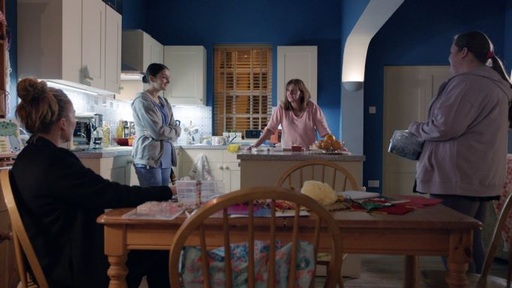Mencap works with Holby City to highlight challenges facing some families of people with disabilities
Mencap has worked with BBC One’s Holby City, to highlight people with a learning disability who “struggle” to access the correct support at home when they display signs of challenging behaviour.

The episode, which aired last night, is based on a nurse at the hospital, Madge, and her daughter, Lizzie, who is autistic and has a learning disability.
In the recent episode, audiences discover Lizzie's behaviour has become increasingly challenging, leading to Madge getting injured. It is revealed the family has not been able to access social care support for Lizzie, and without this, Lizzie’s behaviour has escalated.
According to Mencap, when people with a learning disability display signs of challenging behaviour, it is usually when they have not had their care meets met, live in unsuitable environments, are abused or experience unaddressed physical health issues.
These episodes are triggered by frustration, anxiety and pain rather than intent to harm another person. In some cases when someone’s behaviour escalates, people with a learning disability can be sectioned under the Mental Health Act and admitted to inpatient units.
’He would hit me very badly and I sustained black eyes, broken ribs and bruises’
One parent Leo, whose son Stephen spent six years in an inpatient unit, said: “This Holby City storyline shows what can happen to a family without the right support, and reminds me so much of what happened to us.
“At 18 years old Stephen, who has a learning disability and autism, was sectioned after his behaviour became more challenging and staff at his school struggled to support him.
“He would hit me very badly and I sustained black eyes, broken ribs and bruises – the neighbours often called police. I begged for help from my local authority but was told I was a good parent and coping well, eventually I had to seek legal help to try and get some support. But things deteriorated and Stephen was sectioned.
“Stephen was detained in a psychiatric unit, against our wishes, with much older patients who had a range of different psychological conditions.
“He was far from home and - when I was allowed to see him - he was covered in bruises and gashes from where he had hit himself from being anxious. Stephen’s consultant said that he should be moved somewhere more suitable but it took six years for my son to be discharged.
“It ultimately comes down to social care funding - but money should never be the reason to ignore the human rights of a family and the person alike.”
’People can experience physical restraint and be kept in solitary confinement’
Currently there over 2,000 people with a learning disability and / or autism who continue to be trapped in units where they are at increased risk of abuse.
People are also often held long distances from home with limited interaction with their families and are also in danger of being subjected to restrictive practices - like physical restraint, chemical cosh and solitary confinement.
Most people with a learning disability and / or autism who end up in units could be supported in the community if the right services were in place.
Once detained in units, people deteriorate because the environment is not right for them. This in turn can make their behaviour more challenging, ultimately making it harder to get them discharged.
The charity hopes that Holby City’s storyline will raise awareness of the need for better social care funding so people with a learning disability and their families never reach a crisis situation.
Dan Scorer, head of policy and public affairs at Mencap, said: “Holby City’s storyline highlights what is happening every day in our society – that the social care system is under huge pressure and people with a learning disability and their families are struggling because they can't access the help they need.
“The level of support that someone with a learning disability needs is different for each person - some people may need full¬time care while others will only need help with certain tasks.
“Regardless, good social care support is crucial to people’s wellbeing, independence and health. People with a learning disability can thrive if they have skilled and tailored support at home or in other settings. But, for some people, not getting high-quality support at the right time can lead to crisis and even being admitted to inpatient mental health units. The average length of stay in these places is over five years, and people can experience physical restraint and be kept in solitary confinement.
“Families should never have to reach crisis, and so no-one should become trapped in what are essentially modern-day asylums.”
To read our advice on specialist care for people with behaviours of concern click here
Latest News
 29-Jul-24
Dementia Bus gives carehome.co.uk staff insight into life with dementia
29-Jul-24
Dementia Bus gives carehome.co.uk staff insight into life with dementia
 27-Jul-23
UK's top home care agencies in 2023 revealed
27-Jul-23
UK's top home care agencies in 2023 revealed
 30-Nov-22
A quarter of older people keep their falls secret from family
30-Nov-22
A quarter of older people keep their falls secret from family
 29-Nov-22
'Covid-19 has not gone away' say terminally ill
29-Nov-22
'Covid-19 has not gone away' say terminally ill
 28-Nov-22
IT consultant who received poor care opens 'compassionate' home care business
28-Nov-22
IT consultant who received poor care opens 'compassionate' home care business